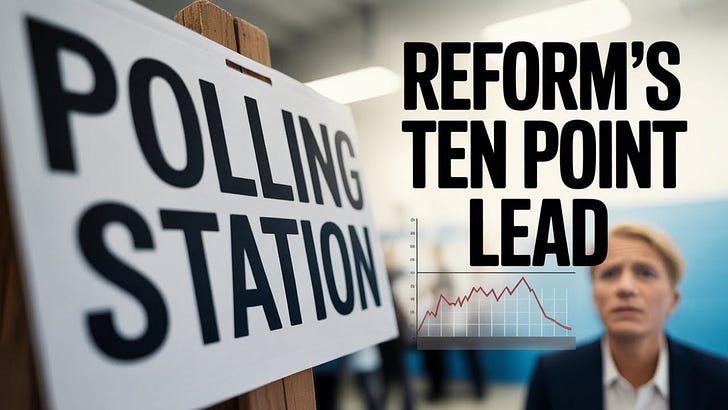Above is a video detailing why I think Reform are 10% ahead in the polls right now. Some of it might be intuitive to you - other bits of it will not, whatever your politics, so I encourage you to watch (and like and subscribe to the channel, please). This article is a companion piece to the video.
Yesterday, the chairman of Reform, Zia Yusuf, dramatically, seemingly out of the blue, quit. It wasn’t a polite sort of quitting either, but a real storm off. “I no longer believe working to get a Reform government elected is a good use of my time, and hereby resign the office.” That isn’t the sort of thing you write if you want to give the impression of an amicable split. That’s a burn the house down as you leave sort of a message to send.
What’s been most interesting to me since this happened has been the response of Nigel Farage. He has acted supportive and understanding of Yusuf, even saying something to the effect on GB News this morning that Zia had been hounded away by right-wing trolls. This is interesting for many reasons. One is immediately tactical - he wants to minimise the fall out from this as much as possible. There is a danger that the “Farage can’t work with anyone” narrative catches hold at some point, and he cannot afford to allow that to happen. By appearing to be the magnanimous one, Farage can seem like the grown up here.
But I think that it reveals more than that. It tells us how much Farage feels like inhabiting some version of the centre ground looms large in his overall strategy for making a massive breakthrough at the next general election, even possibly doing well enough to win a majority for Reform. By going after right-wing trolls on the internet, blaming them for hounding out his friend and chairman, he is clearly attempting to hold onto the positioning he got both from having an Asian Muslim as chair of his party, and that he reinforced with his rejection of Tommy Robinson a couple of months ago. Farage clearly believes that not being seen as a far-right party is crucial to his party’s electoral prospects. I believe that on this point, Farage is completely correct.
Think about it: Farage could have used Yusuf quitting as a means of gaining back some support from the hard-right. He could have said that he thinks the burka should be banned and that anyone who disagrees has no place in Reform, obviously hinting at that as being the reason Zia left. But he did the opposite, sticking up for Yusuf and basically saying it was the bigots that have no place in Reform. A fascinating move - again, one that I believe was the right one for Farage to have made, if he’s serious about winning the next general election.
I would urge you to watch the whole interview with Farage.
When Rupert Lowe quit a couple of months ago, everyone predicted the Reform bubble bursting soon enough. Instead, Reform got almost 700 seats at the local election, won two mayoral contest and a by-election in one of the safest Labour seats in the country. I expect the Zia Yusuf quitting episode to have a similar effect on Reform’s polling, i.e., none. But that’s partly because Farage has played it well. They aren’t 10% ahead in the polls for nothing.




An excellent piece, Nick. I think your analysis is spot on.
Is there a world where the Tories end up to the right of Reform?